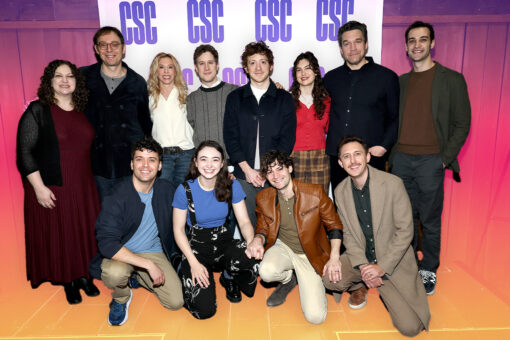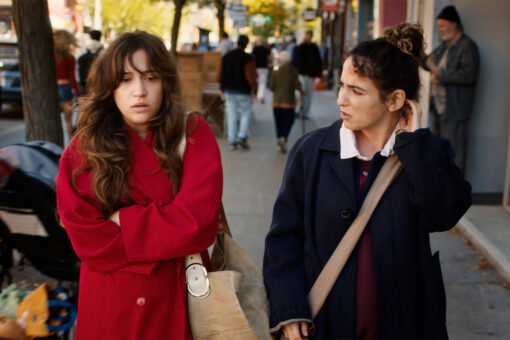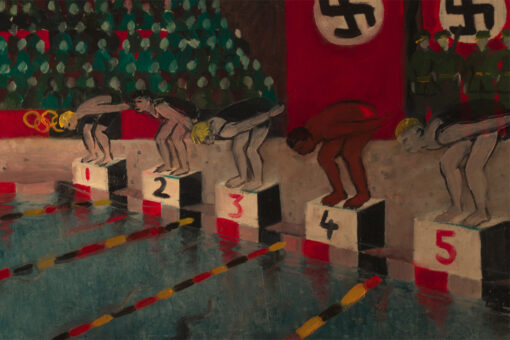Last July, an Orzech stepped foot on Polish soil for the first time in two generations.
Like many Holocaust survivors, my grandfather, Berek Orzech, never returned to his home country after the Holocaust. He grew up in Szydłowiec, Poland, but after the decimation of the Shoah, there was nothing for him to return to, even if he had wanted to return. He raised my mother in Los Angeles, and she has never been able to return to Poland either. But, last summer, I set out to travel across Poland with a group of Jewish genealogists.
I was selected for the 2022 JewishGen Future Scholars Fellowship, which partners with The Matzevah Foundation and Friends of Jewish Heritage in Poland to take Jewish students — many studying genealogy — to Poland. With this group of fellows, I traveled for 10 days to Warsaw, Lublin, Krakow and Przysucha, meeting with scholars and religious leaders, and ultimately working to restore the Przysucha Jewish Cemetery. For many of us, it was a way to give back to family or fellow Jews lost during the Holocaust, and a way to honor ancestral land.
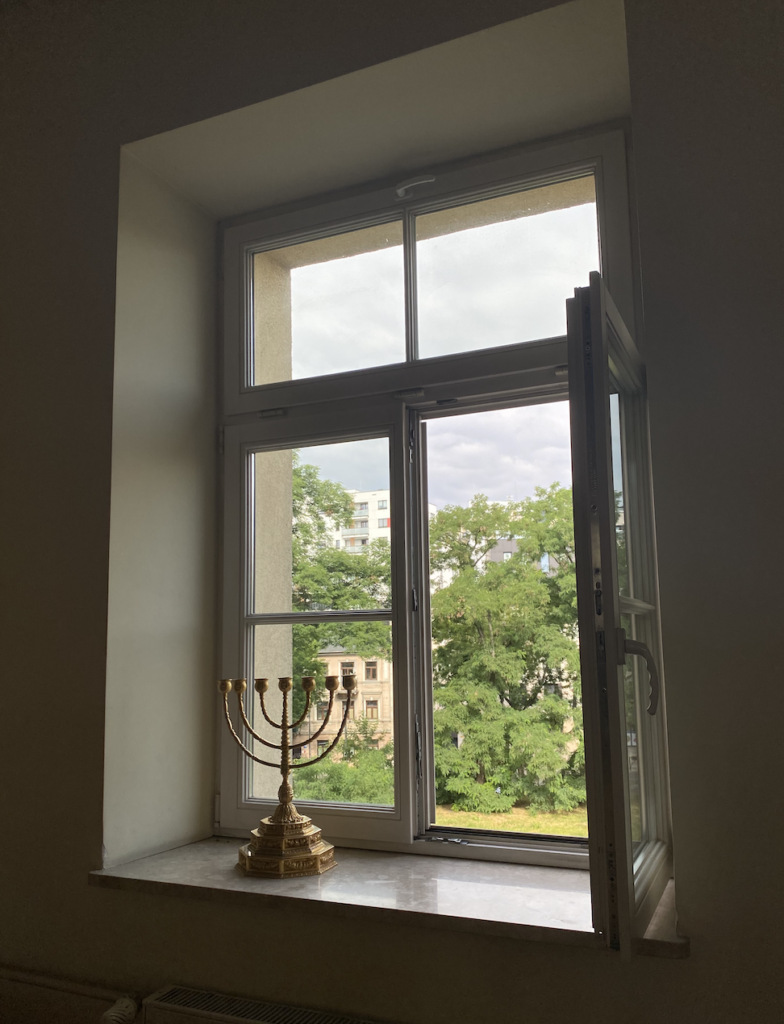
I was struck by many people and perspectives while touring so many incredible cities across Poland, particularly the prevailing attitude that Poles were not responsible for the persecution of the Jews during the Holocaust, instead simply doing what they had to do to get by under Nazi persecution. (One notable exception to this rule was Sabina Sklepik, a non-Jewish Pole and Przysucha native who worked with our group to clear overgrowth at the Przysucha Jewish Cemetery and spoke of her personal guilt for playing there as a child.)
Meanwhile, in Krakow’s “Jewish quarter,” it was philosemitism that seemed to be on display. In what our tour guide coined “Jewish Disneyland,” Krakow restaurant owners advertised their “authentic Jewish restaurants” — most of which served pork. On the streets, vendors sold Judaica alongside SS memorabilia, including gold menorahs and swastika stamps and patches.
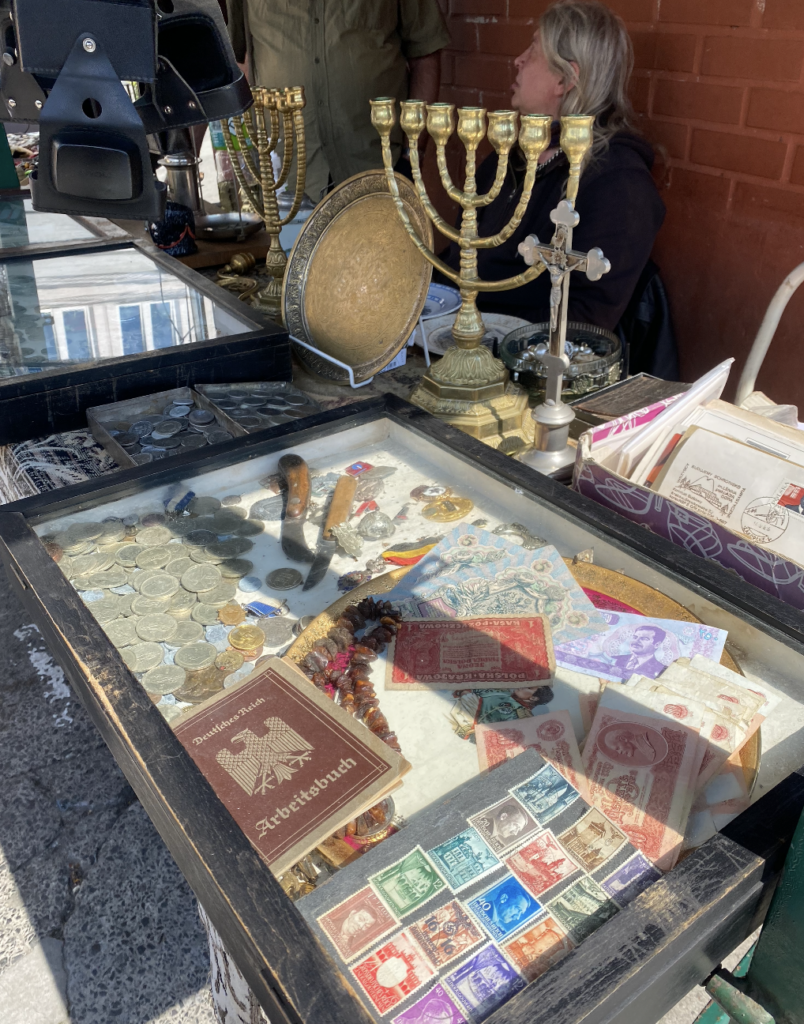
While every Polish town seemed to love the Jews, the preservation of actual Jewish architecture and land seemed to be hit-or-miss. In Tarnow, we were pleasantly surprised with the dedication of Tarnow residents to the Jewish cemetery and old synagogue’s bima remains. But, in Przysucha, the only remaining synagogue seemed to be rotting away. Inside was a gaping space, covered in dust and supported only by ugly, metal beams. Sabina explained to us that this site was once used for public toilets. So, the physical preservation of Jewish life varied from town to town, while cultural preservation seemed to be alive and well, as long as it was slightly altered for tourist consumption.
But, one of the most moving aspects of the trip for me was more personal than it was a learning experience. My visitation of Majdanek represented my family’s first return to the camps.
Though my grandfather was imprisoned at Auschwitz and Mauthausen, I was overcome with emotion a few times while touring Majdanek. While I won’t delve into the details for fear of being too graphic, the suffering was in the air. After placing a stone in front of the gas chambers to honor the victims of Majdanek, I took a rock, too. I felt the need to take back the land. Just a little land, a little portion of the camps that could be controlled by a Jew. I plan to place the rock — in addition to rocks from the Szydłowiec Jewish Cemetery — on my grandfather’s grave, to give him back a bit of the homeland taken from him.
Another poignant, and simultaneously labor intensive, part of the tour was the “cemetery” part, where we aided in cleaning up the Przysucha Jewish Cemetery. The cemetery itself was an incredibly important space, but it wasn’t what made the experience so meaningful to me. There was no doubt that finding tombstones, clearing trees and honoring those buried at the cemetery was significant work. Of course, the broken headstones and mass graves were heartbreaking for us all. In the context of the Holocaust, the cemetery became a place both of suffering and heritage.
But more than anything, I felt that there was great power in the legacy that we were leaving behind.
The Przysucha Jewish cemetery was overgrown, neglected and littered with trash. The headstones were broken and thrown into piles, covered with moss and buried in mud. They had been thrown there after the Holocaust and probably never moved since. Ants and overgrowth ruled, to the point where the gates around the cemetery were nearly invisible. A Jew could not find a loved one in this cemetery, had there been any Jews left in Przysucha at all. It was a stark contrast to the monuments mounted for non-Jewish Holocaust victims in nearby towns.
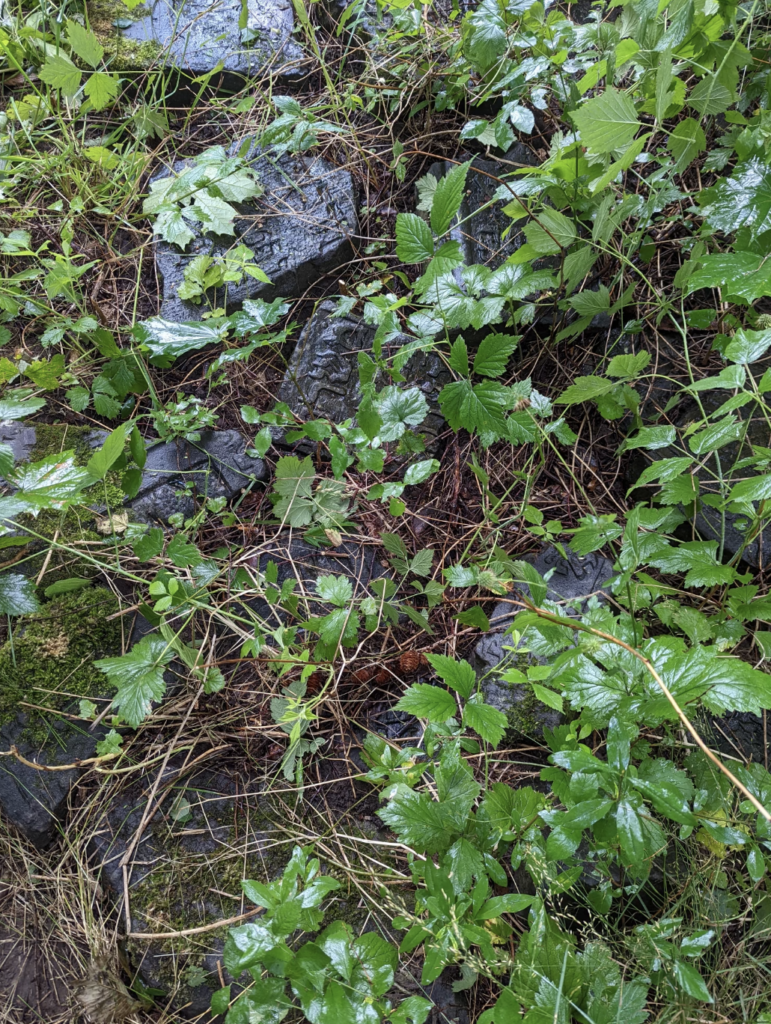
For three days, we cleared the foliage overtaking the Przysucha cemetery. Throughout this time, I spoke with many of the fellows and volunteers about the legacy that we were leaving, the example that we were setting. We had an intense focus on respect and preservation, and our presence made it obvious to the local community that someone cared. Physically, we were cutting down trees and uncovering tombstones. But the plants would grow back and the headstones would be lost again in a few years. More importantly, the neighbors of the cemetery would remember the Americans, Ukranians and Poles that came to clean the cemetery and honor the Jews of Przysucha. Many of the fellows being Polish-American Jews, this community felt like reconciliation, like healing. A band of Jewish Americans and non-Jewish Europeans dedicated to Jewish preservation is something that our persecuted grandparents and great-grandparents could probably have never imagined.
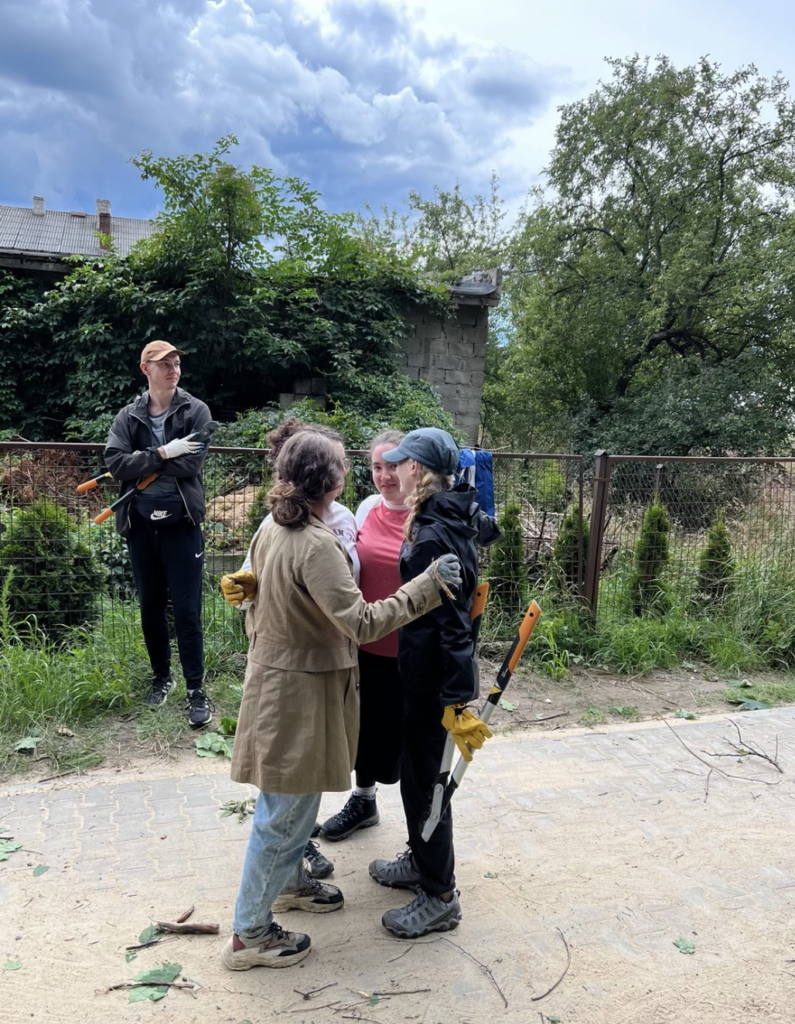
But the Przysucha cemetery wasn’t the only Jewish cemetery we visited.
While on the bus on our first day of cemetery work, a fellow named Jake learned from our bus driver that there was a Jewish cemetery in Szydłowiec, the town where my grandfather and his family had lived. The town had once been predominantly Jewish, and now harbored only one Jewish cemetery and almost no Jewish residents. Our bus driver agreed to take us to the Szydłowiec Jewish Cemetery at the end of the day. Despite being completely beat after a long day of work, we detoured the bus to my family’s cemetery.
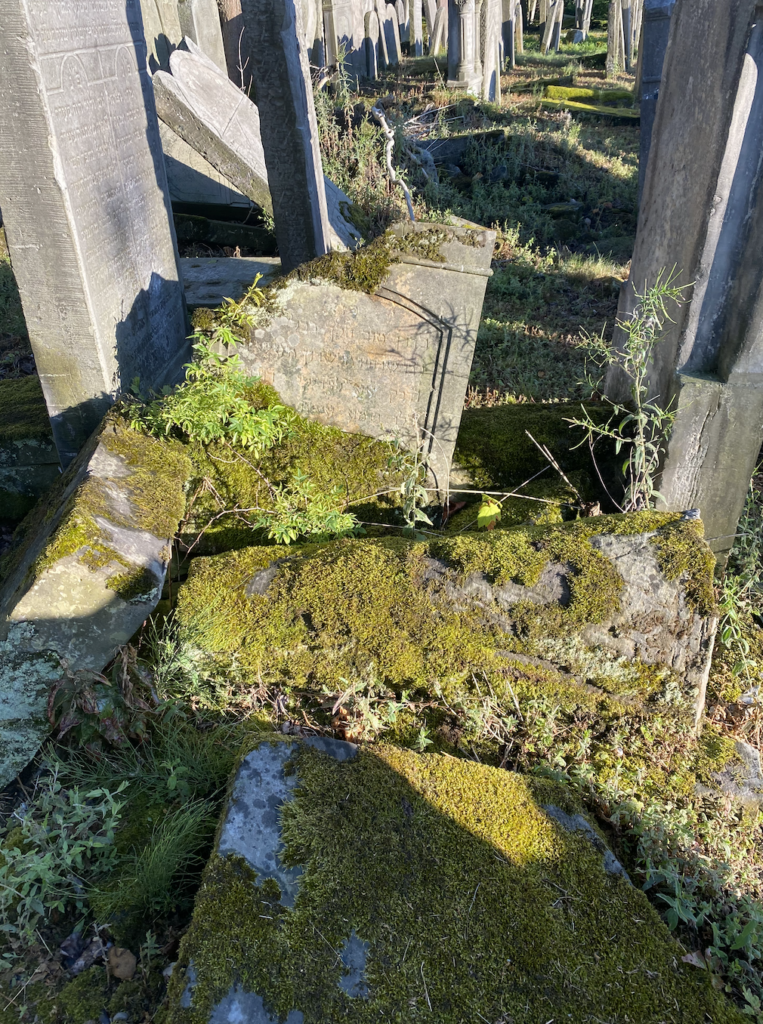
In Krakow, Jake and I had been partners in crime — gaining the best vantage points for his locked family cemetery by hoisting ourselves onto a brick wall overlooking a massive, overgrown collection of tombstones. In Szydłowiec, the gate to the cemetery was locked as well. Once again, Jake hoisted me like a cheerleader over the wall and into the cemetery. He read the Hebrew headstones for me while I toured the rows of graves. This sort of genuine kindness is something that I will never forget. Later on, Lia would do some genealogical research and discover an ancestor of mine featured in a photo I unknowingly took in the cemetery.
I was definitely emotional while walking through the cemetery, but mostly I felt gratitude. Gratitude that I had the opportunity to finally return to an ancestral homeland, but also an intense gratitude for the group — who decided to do this kindness for me, though they all would have probably preferred a shower. The respect and appreciation for each other and our lineage was overwhelming, and I was sobbing as I exited the cemetery.
We completed our cemetery work and I jetted off for JFK. Upon returning home, I filled my family and friend’s ears with Polish town names and residual gratitude. I hope to continue working with incredible organizations who brought me to Poland in the first place. And the next time I step foot in Szydłowiec, it will be with another Orzech: my mother.

